Nancy Gearhart Rice, Thurmont
A way to take one’s mind off the troubled times we now live in is to relive the past with memories. I have called Thurmont my home since the 1950s, so there’s no doubt I’ve seen many changes.
I went to Thurmont High School and learned along with students in grades 1-12, all in the same building. No bad memories stand out from my school years. I took schoolwork seriously and always aimed for good grades.
After high school, in 1962, I was hired by the town clerk, Mr. Guy Frushour, for the position of secretary in the Thurmont Town Office. Although my job title was “secretary,” I wore many hats.
The town’s office building was fairly new, about five years old at that time and became my workplace for the next 25 years. I joined Pauline Firor and Annabelle Taylor in the front office. The public works department was headed by Bill Rice, superintendent, and the following workers: Joe Fraley, Dalton Perry, Harry Sharer, Paul Sweeney, Charles Willhide, Raymond Knott, Manuel Willard, Charles Yingling, Paul Shaffer, Johnny Robinson, Ellsworth Poole, and Kermit Riffle.
Mr. Frushour was a very frugal person, but he was easy to get along with and delighted in telling us stories of his life. He loved talking about his college years at Mount St. Mary’s College in Emmitsburg. He walked from Graceham to the college every day. Sometimes, he was fortunate enough to get a ride. He proudly told us how many footsteps it took to get there. He didn’t have a driver’s license or a car and walked to and from work each day. I would sometimes offer to drive him home, but he usually worked past quitting time.
The electricity and water bills were all computed and written by hand, without the use of adding machines. We had a good supply of scrap paper on which to do the computations. Annabelle would take cards that she had prepared ahead with the customer’s name, account number, and the previous month’s meter reading, and she would transfer the present reading from the meter books to get the month’s kilowatt hour (kWh) usage. Pauline and I would check her subtraction and prepare the customer’s bill. We used pre-calculated rate cards to get the kWh cost, then we computed the sales tax and wrote in the amount due using ink pens. We had to make two copies of the bill (not carbon copies): one for the office and one for the customer. I would then take Pauline’s stack of bills and check all her figures; likewise, she would check mine.
When a customer’s electric or water bills were past due, one could expect a knock on his/her door by Mr. Frushour. He would walk to their home or catch a ride on a town vehicle and attempt to collect the payment or set up a payment plan. The delinquency rate was very low. The town office hours were 8:30 a.m. until 5:00 p.m. on weekdays and 8:30 a.m. until noon on Saturdays.
Each week, usually Wednesday, the parking meter money was collected by someone on the police force. After a meter maid was hired, she did that job. The coins would be dumped on a large table in our office, and two of us would separate the coins and wrap them by hand, except for the pennies. These were wrapped using a hand-crank coin-wrapping machine.
The office was a very comfortable place to work. No freebies were offered. We paid ten cents for a cup of coffee, and a soda machine provided nickel cokes. On Christmas Eve, the employees would be treated to a Christmas lunch. It was held in the stock room on a makeshift table of plywood, and we would get to go home a couple hours early. The office had one adding machine (hand-crank, not electric) that was shared by the three of us. We had manual typewriters, and the office functioned well with one telephone. I was responsible for accounts payable and payroll. Every check was hand written.
I was also secretary to Thurmont Police Chief Clarence Hagelin. On occasion, he would call me in at night to type the statement of persons detained or to type emergency paperwork. There was no copy machine; carbon paper was used. We did whatever it took to get things done.
I was the recording secretary for the board of commissioners for about 20 years. No tape recorder was used. I took notes in shorthand at all meetings and then typed the minutes, which were put into binders having pre-numbered pages.
In 1964, I was part of the very first committee formed to initiate planning and zoning in Thurmont. Public hearings were held in the auditorium of the Thurmont High School. A few meetings became a rather noisy scene. The Thurmont Planning and Zoning Commission was then formed, and I was appointed executive secretary. I processed the very first zoning permits for the citizens of Thurmont. I believe the charge was $3.00.
Mr. Frushour became ill in 1966, and his position was filled by Glenn Nikirk. Mr. Nikirk was also zoning administrator. During his time, the office became more modernized. He was instrumental in getting the first grants for the town. In 1978, Mr. Nikirk resigned to take a position with the City of Frederick. Mayor C. Ray Weddle asked me to accept the position of zoning administrator, which I did and served in that capacity for nearly 10 years.
During these years, I also became the unofficial town office historian and answered inquiries from many seeking information about their ancestors. Here’s one such letter, sent from Putnam, CT. in 1964.
Addressed To: “Either Town Manager, Selectman, Mayor or whoever is in charge of Thurmont, Maryland.”
“To whom it may concern; In 1928 I was shown by a person, a little white cottage at a corner in Thurmont, Md. on the road to Baltimore. Now, I am told there never was a house there. I never took a drop in my life. I’m 84, so there is something or someone cockeyed. Enclosed is a stamped, self-addressed envelope for an answer. My defunct wife was born there in 1897, April 2nd.”
After exchanging a couple letters with the sender to gather more information, we determined the location of the house in question.
Thurmont was a small town back then and much less populated. We knew every resident and most everything about them. The majority of the residents came in person to pay utility bills, usually by cash.
I am proud to have known and worked under Mayors Donald L. Lewis, Roy W. Lookingbill, C. Ray Weddle, and James F. Black, and I feel fortunate to have watched our town grow over the past 70-plus years.
I can still remember:
The Zimmerman ladies, wearing long dresses and standing on their side porch (later removed) at the stone house on the corner of West Main Street and Altamont Avenue.
Buck Lewis walking from his gas station to direct traffic at the square when the fire alarm sounded.
Ice cream sundaes from Domingue’s and Donald Lewis’ soda fountains.
Buying clothing and shoes at Shappy’s on the Square.
The canning factory in operation.
The State Theatre.
Donald and Freida Lewis’ card and gift shop and Toy Land.
The Thurmont train station in operation.
Both the Dixie Diner and Davy’s Diner on Water Street.
And that is how some things used to be. I am hoping this stirs the minds of the few residents of Thurmont who can remember these times.
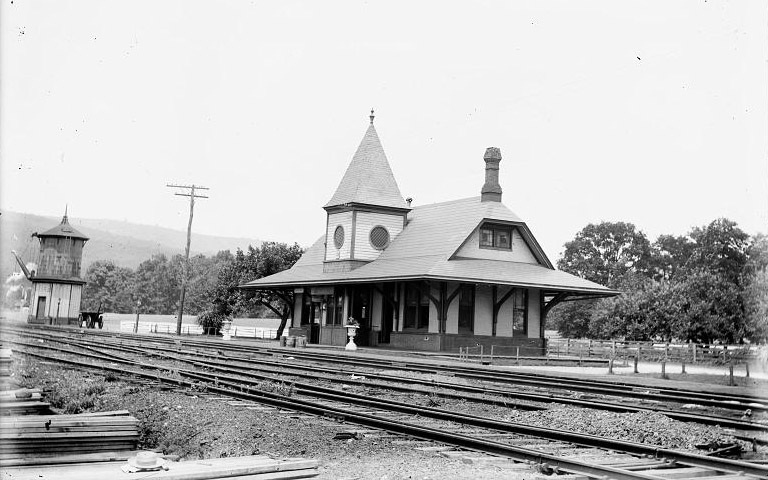
The Western Maryland Train Station, taken looking west from Boundary Avenue across the main line. At the left can be seen one of the water towers used to water the engines as they stopped in Thurmont.
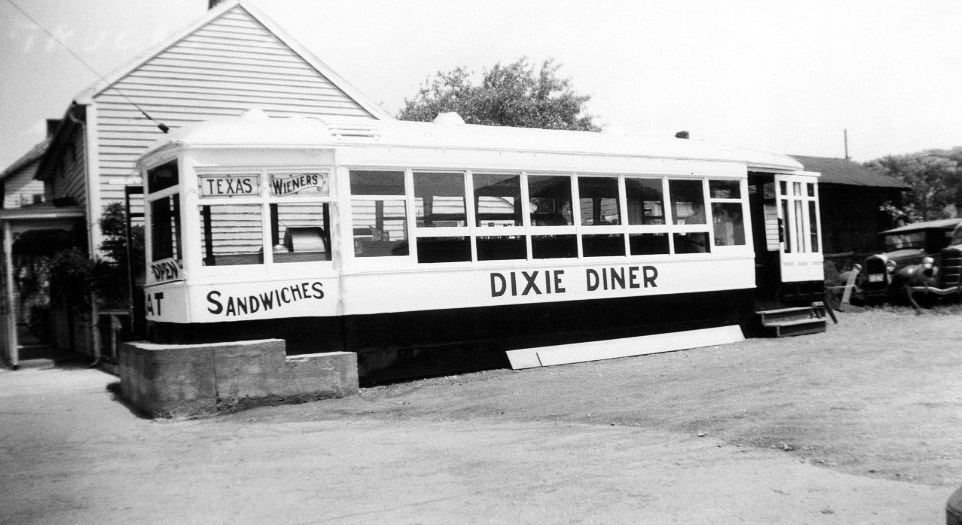
Photo of the Dixie Diner, taken in 1939. The Dixie Diner was built in the late 1930s using an old H&FRR car by Mary and Leonard Fogle. After several years, the Dixie was enlarged by adding a second trolley car to the far end. It was operated by several individuals over the years, including Mary Fogle, Bill Houck, Audie and Audrey Moore, and Myrtle and Jim Steele. The restaurant sat on Water Street at the Frederick Road intersection between the Fogle’s house and garage. The Center of Life Chiropractic Center sits in this general vicinity today.
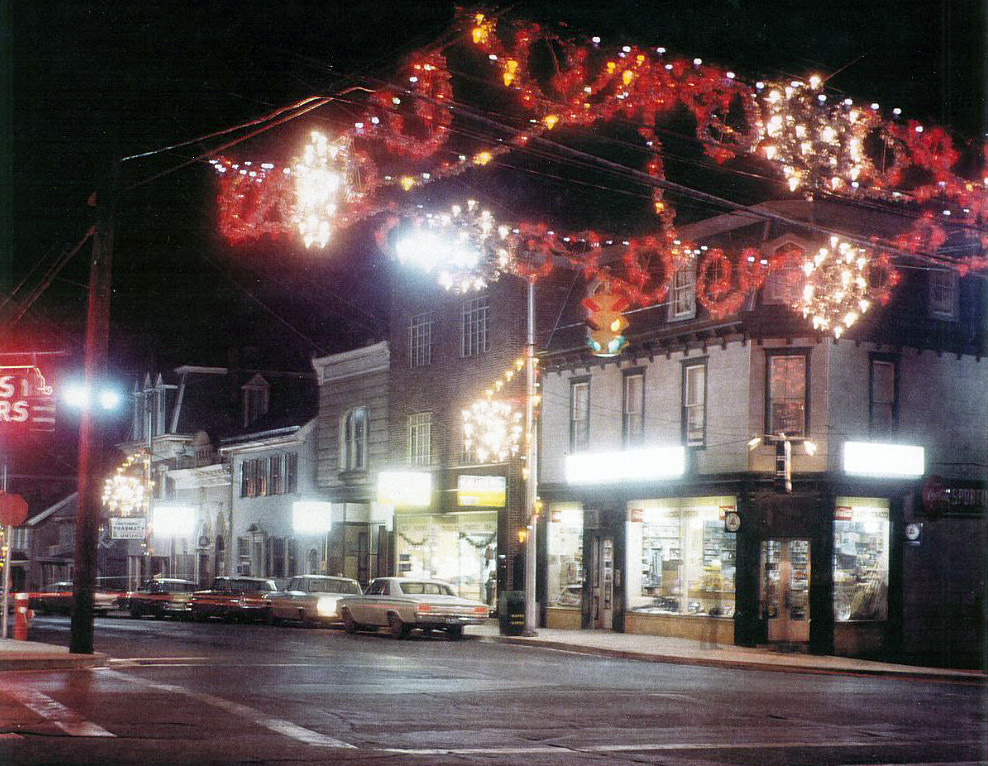
This photograph (above) of Christmas lights at the Square in Thurmont dates from the early 1960s. All the businesses were all lit up, with the most prominent being Donald and Freda Lewis’s Corner Store.
The Lewis’s purchased this business in 1952 from the Wisotzkey Brothers. The store featured an amazing soda fountain bar along the far wall, a great selection of candies, cards, gifts, magazines, and of course, Toy Land upstairs. Lewis’s was located on the Square at the intersection of East Main Street and Water Street.
The next storefront down East Main Street also belonged to the Lewis’s and housed the Lewis Sporting Good Store. Donald was an avid fisherman and was always willing to offer advice about equipment or the best spots to fish. One of the most interesting features of the building was the corner door seen here; the Thurmont Bank building across the street also featured a corner door. Donald and Freda were very involved in the town (Donald was a Thurmont Mayor and Frederick County Commissioner) and loved by everyone. Freda died in 2004 and Donald in 2018.
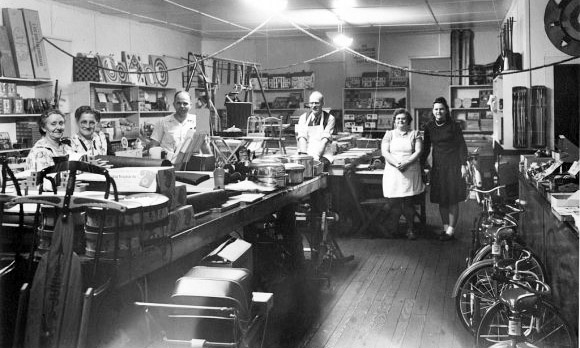
On the second floor of the Wisotzkey store on the square was Toy Land! This was the place to go to see toys of all kinds, including bikes, doll houses, games, sleds, drums, baby buggies, swing sets, child-sized chairs, dart boards, and lots of other wonderful toys. Donald Lewis kept Toy Land open for many years as well. Pictured (from left): Unknown lady, Mary Mae Wisotzkey, Donnie Marshall, Roy Wisotzkey, Elizabeth Wisotzkey, and Doris Fitzgerald.
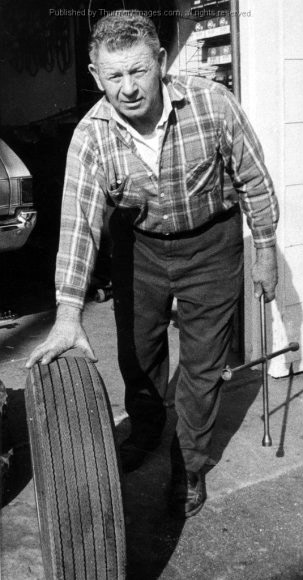
Buck Lewis at his Sinclair Gas and Service Station. After Buck closed the station, the building served as an ice cream parlor and a seafood/sandwich shop.
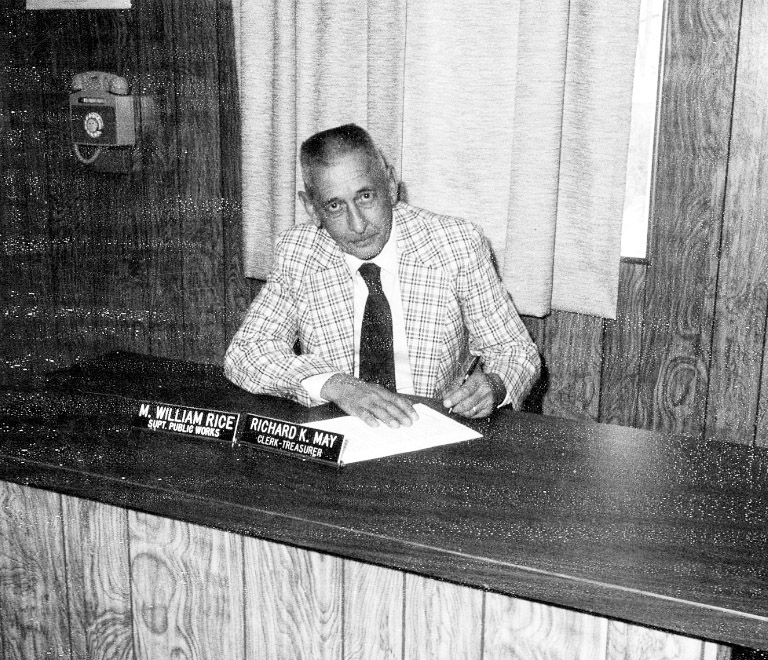
Thurmont Mayor James Black signing a document in the meeting room at the old town offices, located at 10 Frederick Road.

